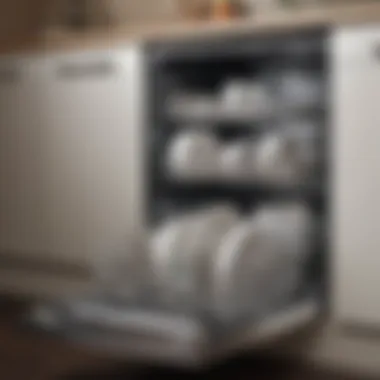Using Bleach to Clean Your Dishwasher: Insights


Intro
Maintaining the cleanliness of household appliances often goes overlooked, yet it is crucial for functionality and hygiene. The dishwasher is an essential appliance in many kitchens, tasked with handling the post-meal cleanup. Over time, food debris and grease can accumulate, necessitating a thorough cleaning. One common method employed by homeowners is using bleach. However, while bleach can be effective, its use comes with significant considerations. This article dives into the insights and implications of using bleach to clean dishwashers, assessing its effectiveness and highlighting safer alternatives for appliance cleaning.
Effectiveness of Bleach
Bleach, particularly sodium hypochlorite, possesses powerful disinfecting properties. This can help in eliminating bacteria and mold that may form in damp and dark environments such as dishwashers. When properly diluted, bleach can effectively remove stubborn stains and restore the sparkle to your appliance's interior. However, the effectiveness of bleach is contingent on several factors:
- Concentration: A higher concentration can yield better results but also increases the risks.
- Exposure Time: Allowing bleach to dwell can enhance its effectiveness, but excessive exposure can damage surfaces.
- Rinsing: Proper rinsing is vital to prevent residues from affecting dish cleanliness.
While bleach can disinfect, its harshness also raises concerns about potential damage.
Potential Risks
The use of bleach presents certain hazards that cannot be ignored. Among these are:
- Corrosion: Bleach can corrode rubber seals and plastic parts, leading to costly repairs or replacements.
- Fumes: The vapors released during the use of bleach can be harmful if inhaled, potentially causing respiratory issues. It is essential to ensure proper ventilation when using bleach.
- Chemical Reactions: Mixing bleach with other cleaning agents, especially those containing ammonia, can create toxic gases.
In light of these considerations, homeowners should weigh the pros and cons before deciding to use bleach in their dishwashers.
Alternatives to Bleach
For those hesitant to use bleach, several alternatives can maintain dishwasher hygiene without the associated risks:
- Vinegar: A natural deodorizer, vinegar can help break down mineral buildup. It is best used by placing a cup of vinegar in the top rack and running a hot cycle.
- Baking Soda: This is effective for deodorizing and can be sprinkled on the bottom of the dishwasher after a vinegar wash.
- Commercial Dishwasher Cleaners: Many products are specifically formulated for cleaning dishwashers, often containing safer ingredients that may be less harmful to your appliance.
Safe Cleaning Practices
If one decides to employ bleach as a cleaning agent, adhering to certain practices can minimize risks. Important steps include:
- Dilute the Bleach: A common recommendation is to dilute one cup of bleach in a gallon of water.
- Apply with Caution: Avoid pouring directly onto surfaces and instead use a sponge.
- Rinse Thoroughly: Ensure that all bleach residue is removed by running an empty cycle with plain water afterwards.
Following these measures can help ensure that cleaning your dishwasher does not compromise its longevity or safety.
Epilogue
Using bleach to clean your dishwasher may have some merits, but it is essential to consider the potential drawbacks. Weighing the benefits against the risks, including possible damage to the appliance and health hazards, makes it clear that alternative methods are often preferable. Keeping your dishwasher clean and functional can be achieved through safer means, ensuring both appliance efficiency and personal health. By making informed decisions, homeowners can maintain a hygienic cooking environment without undue risks.


Understanding Dishwasher Maintenance
Maintaining a dishwasher is crucial for its longevity and performance. A well-maintained appliance not only ensures efficiency but also promotes hygiene. Regular upkeep prevents the accumulation of food particles and unpleasant odors, thereby enhancing the overall user experience. Frequent cleaning minimizes the risk of costly repairs. Also, it contributes to energy savings, as a clean dishwasher operates more effectively.
Importance of Regular Cleaning
Regular cleaning of a dishwasher is essential for several reasons. First, it prevents odors that can develop due to food residue. Second, it ensures the appliance works efficiently, leading to better cleaning results. Lastly, it can extend the lifespan of the dishwasher. Failure to maintain hygiene can result in costly damages and performance issues. In essence, the overall benefit includes a healthier kitchen environment and prolonged appliance life.
Common Dishwasher Problems
Dishwashers can face various issues, which often stem from neglecting maintenance. A few common problems include:
- Odor Issues
Odor issues are often caused by trapped food particles in filters and corners. The primary downside of lingering odors is their unpleasantness, which may deter usage. Regular cleaning can notably reduce these odors. - Residue Buildup
Residue buildup occurs when detergents and food particles remain in the appliance. This buildup leads to poor cleaning performance and may even affect the taste of dishes. Regular maintenance is essential to ensure all surfaces are clear of debris. - Performance Decline
Performance decline in dishwashers manifests as ineffective washing or longer cycles. This issue can result from multiple factors, including residue, clogged filters or worn-out components. Addressing maintenance promptly can mitigate these performance issues and maintain efficiency.
The Role of Bleach in Household Cleaning
The use of bleach in household cleaning is a subject of importance that warrants careful consideration. Bleach has been a staple in many homes for its effectiveness in sanitizing and disinfecting surfaces. Its application in a variety of contexts, from laundry to kitchen cleaning, highlights its versatility as a cleaning agent. This section aims to delve into the key elements surrounding the role of bleach in household cleaning, weighing its benefits against the potential risks.
Bleach, primarily composed of sodium hypochlorite, offers a powerful means to eliminate germs and bacteria. Its effectiveness is particularly noticeable in settings where sanitation is critical. This property makes bleach a sought-after choice for ensuring surfaces are hygienic, especially in kitchens and bathrooms, where the presence of pathogens is a concern. However, the properties of bleach also necessitate a cautious approach during its use.
Chemical Composition of Bleach
The chemical makeup of bleach is essential to understanding its function. Most household bleach solutions consist of sodium hypochlorite diluted in water. This compound is a strong oxidizing agent, capable of breaking down organic materials and destroying contaminants.
- Sodium Hypochlorite: This is the key ingredient that instills bleach with its disinfecting properties. When it comes into contact with bacteria or viruses, sodium hypochlorite penetrates their cell walls and disrupts their functions, effectively killing them.
- Concentration Levels: The concentration of bleach can vary, and this affects its cleaning efficacy. Generally, household bleach ranges from 3% to 8% sodium hypochlorite. Higher concentrations are typically reserved for industrial uses.
Despite its strength as a disinfectant, the potential for damage exists. When used improperly or in high concentrations, bleach can corrode metal surfaces or degrade plastic components found in dishwashers.
Antimicrobial Properties
The antimicrobial properties of bleach are significant in maintaining a clean environment. Its ability to eliminate a wide range of pathogens is not only beneficial in household cleaning but also crucial in areas requiring stringent hygiene standards.
- Broad Spectrum Efficacy: Bleach is effective against various microorganisms, including bacteria, viruses, and fungi. This broad-spectrum capability makes it a popular choice in settings such as hospitals and food preparation areas.
- Quick Action: Bleach acts rapidly to neutralize harmful microbes. This characteristic is beneficial in situations where rapid sanitation is required, such as after an illness in the home or when dealing with foodborne bacteria.
However, the use of bleach is not without its drawbacks. Prolonged exposure to bleach can damage materials and surfaces, reducing their lifespan. Moreover, the interaction of bleach with other household cleaning products can yield harmful reactions, necessitating a cautious approach to its application.
"Understanding the chemical interactions and potential risks associated with bleach is vital for safe household cleaning practices."
In summary, while bleach undeniably plays a significant role in household cleaning due to its effectiveness as a disinfectant, careful consideration must be given to its composition and potential repercussions. The balance between utilizing its benefits and mitigating risks is fundamental in employing bleach correctly in various cleaning tasks.


Can Bleach be Used in Dishwashers?
Understanding whether bleach can be safely used in dishwashers is critical for those looking to maintain appliance hygiene without causing damage. While bleach has notable antimicrobial properties that can eliminate bacteria and other pathogens, its application must be thoughtful. Using bleach could lead to unintended consequences, both in terms of appliance functionality and longevity. This section will deliberate on manufacturer recommendations as well as the potential risks that could surface when using bleach in dishwashers.
Manufacturer Recommendations
Most dishwasher manufacturers advise against using bleach in their appliances. The reasoning is often rooted in the potential for damage to internal components and seals. Instead, they recommend specific cleaning agents that are designed to be safe for the materials used in dishwasher construction. It is paramount for users to refer to their user manuals to understand the cleaning products approved by the manufacturer. Following these guidelines ensures not just the effectiveness of the cleaning process but also the warranty coverage of the appliance.
Potential Risks of Bleach in Dishwashers
Using bleach in dishwashers, while tempting for its cleaning potential, carries multiple risks. The following points outline the main concerns:
Damage to Seals and Gaskets
Bleach can degrade the rubber seals and gaskets found in most dishwashers. These components are crucial for maintaining the appliance’s efficiency and effectiveness. When bleach is introduced, it can lead to brittleness, causing cracks or leaks over time. This deterioration may not only impact the performance of the dishwasher but can also lead to costly repairs or replacements. Thus, avoiding bleach can preserve the integrity of these vital parts.
Corrosion of Internal Components
Bleach is a corrosive substance. Prolonged exposure to bleach can eventually lead to corrosion of metal components within the dishwasher. This includes items like the heating element and spray arms. Corroded parts can hinder the appliance’s ability to operate efficiently, ultimately shortening its lifespan. The corrosive nature of bleach makes it unsuitable for a device designed for prolonged exposure to moisture and heat.
Mixing Incompatible Chemicals
There is also a risk associated with mixing bleach with other cleaning substances, which may produce harmful reactions. For instance, combining bleach with vinegar can create chlorine gas, which is toxic. This risk multiplies if users do not thoroughly rinse and clean the dishwasher before subsequent cleanings. Users should be cautious and avoid mixing bleach with any other detergent or cleaning agent to prevent dangerous reactions that can compromise health and safety.
In summary, while the appeal of using bleach for dishwasher maintenance is understandable, the risks and damages this chemical can induce outweigh the immediate benefits. Users should consider safer alternatives and strictly adhere to the manufacturer’s cleaning recommendations to maintain optimal performance and longevity of their dishwashing appliances.
Alternatives to Bleach for Dishwasher Cleaning
Considering the potential risks associated with bleach, exploring alternatives for dishwasher cleaning becomes essential. Many homeowners seek effective solutions that can sanitize and maintain their appliances without the hazards that bleach presents. This section discusses various alternatives, focusing on their benefits and instructions on how to use them effectively.
Vinegar as a Natural Cleaner
Vinegar is a popular choice due to its natural cleaning properties. It helps to neutralize odors and aids in breaking down mineral deposits. To use vinegar in your dishwasher, simply place a cup of distilled white vinegar in a dishwasher-safe container on the top rack. Run a hot water cycle. The vinegar helps eliminate grime and leaves the interior smelling fresh.
Natural cleaners like vinegar can provide a simple, eco-friendly solution for maintaining dishwasher hygiene.
Baking Soda for Odor Removal


Baking soda is another effective alternative which is well-known for its odor-neutralizing abilities. To use it, sprinkle a cup of baking soda on the bottom of the dishwasher and run a short cycle. This method not only helps in eliminating odors but can also aid in handling light stains and residues. The combination of baking soda and vinegar can create a powerful cleaning reaction, resulting in a spotless interior.
Commercial Dishwasher Cleaners
For those preferring specific commercial options, there are several dishwasher cleaners available in the market. These products are specially formulated for dishwashers, making them an effective choice for deep cleaning. When selecting a commercial cleaner, be sure to read the labels for compatibility with your appliance. Using these products usually requires following the instructions provided, which often recommend running a cleaning cycle or placing the cleaner in specified locations within the dishwasher. They can tackle tough residues that natural alternatives might not fully remove.
The End of Alternatives
In summary, several alternatives to bleach exist for cleaning dishwashers effectively. Vinegar, baking soda, and commercial cleaners each offer unique benefits that can support maintaining a hygienic and efficient appliance. Choosing the right method depends on personal preferences and the specific cleaning needs of your dishwasher.
Safety Precautions When Cleaning Dishwashers
Cleaning dishwashers may seem simple, but it involves chemicals and potential hazards. Taking appropriate safety precautions ensures that the cleaning process is effective and safe. Ignoring these precautions can lead to health risks, appliance damage, or even dangerous situations. Therefore, understanding safety protocols is crucial for anyone considering bleach or other cleaning agents in their dishwashers. A safe cleaning environment will promote efficient cleaning and protect users from unnecessary risks.
Protective Gear Recommendations
When using bleach or any strong cleaning chemicals, it is important to wear proper protective gear. This can include:
- Gloves: Use rubber or latex gloves to protect your hands from direct contact with bleach.
- Goggles: These will shield your eyes from splashes that could cause irritation or burns.
- Mask: A face mask can prevent inhaling harmful fumes, particularly in smaller spaces.
Investing in protective gear is a small effort for significant safety. It serves to minimize exposure to hazardous substances and reduces the risk of accidents.
Proper Ventilation
Ventilation is critical when using bleach in confined spaces such as dishwashers. Ensuring a steady flow of fresh air can mitigate the buildup of fumes that bleach emits. To achieve this:
- Open Windows: Whenever possible, open the kitchen windows to allow fresh air to circulate.
- Use Exhaust Fans: Turn on any available kitchen exhaust fans to help ventilate the area.
- Keep the Door Open: If safety permits, leave the dishwasher door open while cleaning to dissipate any fumes more quickly.
Proper ventilation not only enhances safety but also makes the cleaning process more pleasant. Foggy air doesn’t just obscure sight; it can also contribute to discomfort and health risks.
Always prioritize safety when cleaning appliances. Your health and the functionality of your appliance depend on it.
Ending
In summation, the utilization of bleach as a cleaning agent for dishwashers is a topic that warrants careful consideration. This article has explored the various aspects of using bleach, recognizing both its potential benefits and significant risks. Homeowners often seek efficient methods to maintain appliance hygiene, yet it is crucial to understand the implications of their choices.
Summary of Key Points
- Effectiveness of Bleach: Bleach effectively kills germs and removes stains but can cause damage to the dishwasher's internal components.
- Manufacturer Warnings: Many manufacturers advise against using bleach due to potential harm to seals and gaskets.
- Alternatives Available: There are various non-bleach alternatives such as vinegar, baking soda, and commercial cleaners that are safe for dishwashers and still achieve good results.
- Safety Precautions: Proper safety measures like wearing gloves and ensuring good ventilation are vital when using any strong cleaning agents.
Final Recommendations
For those considering bleach for cleaning their dishwashers, it is advisable to proceed with caution. First, check the manufacturer's guidelines on suitable cleaning agents. If bleach is used, ensure it is heavily diluted and avoid mixing with other cleaning products to prevent chemical reactions.
Alternatively, explore safer options like vinegar or baking soda. These natural cleaners are effective at tackling odors and residue without posing risks to the appliance's longevity. Regular cleaning is key, coupled with awareness of the products used.



